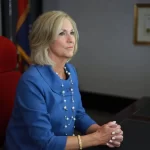United States Attorney recognizes World Day Against Trafficking in Persons
July 30 – The United Nations General Assembly has declared July 30 as “World Day Against Trafficking in Persons,” and urges accelerated action to end child trafficking. Clay Joyner, U.S. Attorney for the Northern District of Mississippi, has committed efforts to raise awareness and combat this growing epidemic. “Human trafficking, particularly the trafficking of children, is an outrage that cannot be tolerated,” remarked Joyner. “This office will do everything in our power to root out this evil and protect vulnerable victims.”
What is human trafficking?
The most common forms of human trafficking are sexual exploitation and forced labor. Human trafficking occurs when a trafficker uses force, fraud or coercion to control another person for the purpose of engaging in commercial sex acts or soliciting labor or services against his/her will. Any commercial sex act involving someone under the age of 18 is human trafficking.
Traffickers can be organized groups but also the victim’s own family. One in three victims of human trafficking globally is a child, with girls being disproportionately affected. Often, child exploitation cases meet the definition of trafficking if the crime involves a sex act in exchange for something of value, including money, food, shelter, clothing, or other items.
Identification and protection of child victims remain challenging due to underreporting and lack of awareness. Traffickers often employ coercion, deception, and threats to maintain control over their victims, making it difficult for authorities to intervene. Citizens should be aware of the signs to assist in recognizing and reporting trafficking.
What are the signs?
- Lack of identifying documents such as a driver’s license or passport. Traffickers seize these from their victims to restrict their freedom of movement and limit their actions.
- Lack of control of their own money. Traffickers withhold or deny wages, and limit access to cash in order to control their victims.
- Signs of physical abuse such as bruises or scars.
- Unusual fearfulness. Victims may be working under threats to themselves, their family, their property or their freedom.
- Unwillingness to communicate or socialize. Victims may be fearful of communicating with their friends, family or authorities.
- Lack of food, sleep or proper care. Victims may be subject to very poor living conditions and treatment.
- Being underage for their work, especially if it involves commercial sex.
Resources are available for trafficking victims and include response by local, state, and Federal law enforcement. If you or someone you know is a victim of human trafficking, assistance is available 24/7 immediately from local law enforcement and through the National Human Trafficking Hotline. A confidential report can be made by visiting https://humantraffickinghotline.org, calling 1-888-373-7888, or sending a text to BeFree (233733).
Though this is a crime occurring globally, trafficking is present at the local level. The U.S. Attorney’s Office urges citizens in the Northern District of Mississippi to report suspected trafficking.
In Mississippi, you can make a report to the statewide human trafficking coordinator by emailing ReportHT@dps.ms.gov or calling 601-987-1671. Any report involving a victim under 18 being trafficked must be reported to the Mississippi Department of Child Protection Services online at https://reportabuse.mdcps.ms.gov/ or by calling 1-800-222-8000.






